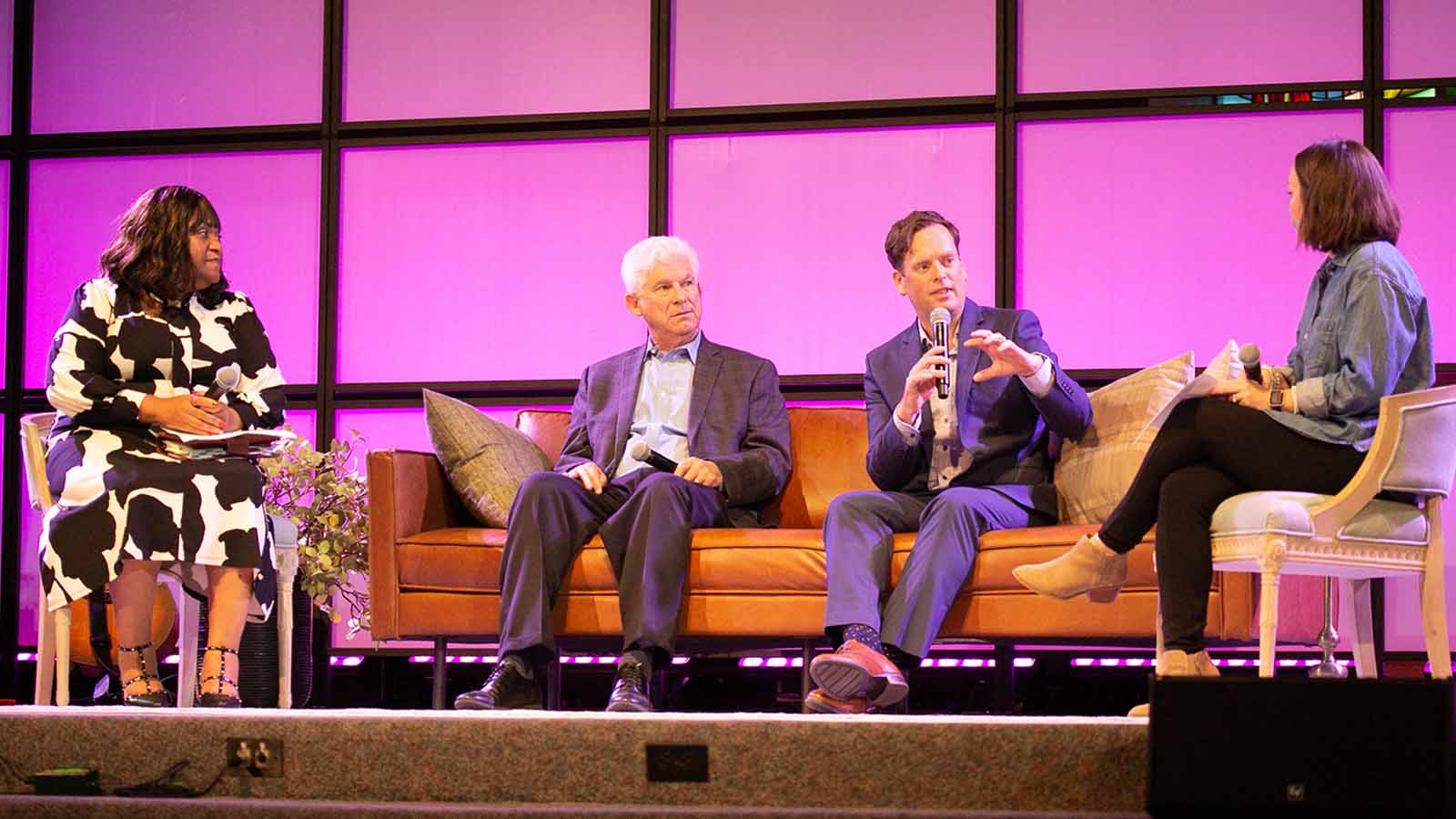University Hosts Panel Discussion on Mental Health During Chapel Service Nov. 10
November 10, 2021
OBU hosted a special chapel service Nov. 10 featuring a mental health discussion panel. The panelists discussed how to deal with crisis, depression and other issues as well as the help and services available to students.
Brandon Peterson, dean of students and vice president of campus life, began the service by introducing the panelists and sharing statistics on mental health, specifically as it applies to college students. Panelists included Dr. Jerry Allan Gates, former director of inpatient therapy and intensive outpatient programs at Laureate Psychiatric Hospital in Tulsa, Oklahoma; Dr. Canaan Crane, professor of psychology and director of OBU’s marriage and family therapy program; and LaShane Hill, director of the Kemp Marriage and Family Therapy Clinic on the OBU campus. The panel was moderated by Erin Guleserian, director of the residential experience.
Guleserian began the discussion by posing the questions, “What is mental health and what is mental illness?”
Crane pointed out that although mental health does deal with things like depression and anxiety, mental illness is much broader than those diagnoses.
“I’m interested in the challenges that individuals have around emotions and the way they think,” he said. “But also around their behavior and how that connects back to our relationships with family and the world and our relationships with God.”
Gates then explained his idea how to conceptualize mental illness.
“When we talk about mental illness, we talk about the idea of brain disorders,” he said. “When we look at mental illness, specifically, we talk about three or four different things like genetics, biology and psychological trauma.”
According to Gates, all of these factors play into the occurrence of brain disorders.
“It’s important to understand that people aren’t weak or stupid or faking it,” he said. “People really do have brain disorders.”
Hill then gave a demonstration that she uses with patients to show two important parts of the brain that control emotions and rationality. With her hand, she depicted the amygdala with her thumb and the prefrontal cortex with her four fingers. She showed how the positioning of the two sections of the brain changes when the brain is under stress, making rationality and reasoning much more difficult.
Guleserian then moved the discussion to how mental health plays into being a holistic person. Crane discussed how physical factors like food, sleep, exercise, faith and learning can affect the brain and contribute to the mental health of a holistic person. Gates then explained how he uses the word “person” with his patients to showcase how life is about balance between four things that all happen to align with some of the letters used to spell “person.”
According to Gates, “P” stands for physical, “E” stands for emotional, “R” stands for relational and “S” stands for spiritual.
“All four of those areas have to be in balance,” he said.
Hill then emphasized how our mental and physical selves are connected, saying, “You are a whole person and you cannot separate your brain from your body.”
The discussion then addressed how faith plays a role in mental health and in the treatment of mental health disorders.
“God cares,” Gates said. “God cares about our mental health. God cares about our emotional health.”
He referenced Matthew 5 where Jesus talks about anger, forgiveness, depression and anxiety, issues that all humans encounter and deal with. According to Gates, this shows how God cares and provides us with more than one resource like prayer to seek help with our mental health. On top of spiritual healing and help, God provides people, therapy, medication and more to help us.
To conclude the discussion, Guleserian asked the panelists, “What might be something that would prompt someone to seek help?”
Hill responded by saying that if you’re in a place where you can’t control your emotions, “Those are some signs that whatever you have going on in your life, you can’t hold it by yourself.”
Crane then shared his perspective.
“If I’m encountering these challenges or difficulties and I find them bleeding over into multiple areas of my life, that's again more of a sign to me that I’m not able to hold those by myself.”
He then noted that when you’re feeling overwhelmed or like you can’t do this on your own, that is a sign that you need to seek help, whether that be professional, medical, spiritual or relational.
Guleserian concluded the service by reminding students of the mental health resources they have on campus including the Kemp MFT Clinic, pastors, residential life staff members, friends and more.
The University encourages all students and employees to utilize services available to them through the Kemp MFT Clinic. Students receive 10 free sessions per year, with additional sessions available for only $10 each. Employees receive three free sessions per year, with additional sessions available at a sliding fee scale based on household size and income. All services are completely confidential. The Kemp MFT Clinic provides individual therapy, premarital therapy, couples therapy, family therapy and art/play therapy for those experiencing stress, anxiety, depression, emotional issues, grief, trauma, relationship concerns, coping issues and more.
Learn more about the Kemp MFT Clinic at OBU.
